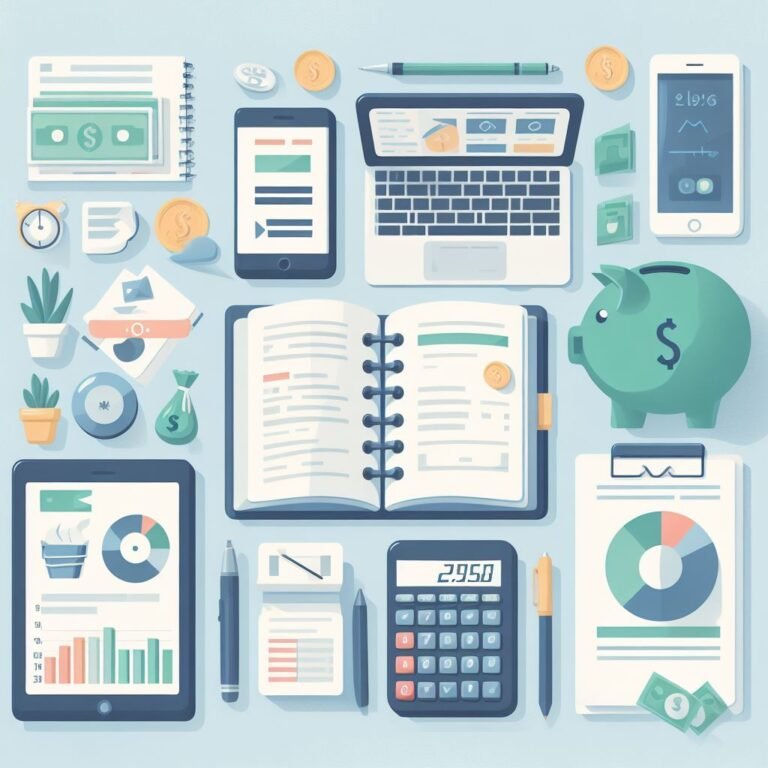10 Proven Tips to Boost Your Credit Score
Your credit score is more than just a number in today’s financial landscape. It reflects your financial health and trustworthiness and can significantly impact your ability to secure loans, credit cards, and even specific jobs. A higher credit score can open doors to lower interest rates, better financial opportunities, and peace of mind. But what if your score isn’t where you’d like it to be? Fear not! In this article, we’ll delve into top tips to improve your credit score, offering actionable steps to control your financial future. Whether you’re just starting out or looking to boost your score, these tips are tailored to help you succeed.
Table of Contents
1. Understanding Your Credit Score
Your credit score is a numerical representation of your creditworthiness, typically ranging from 300 to 850. The higher the score, the more financially trustworthy you are perceived to be by lenders. But what goes into this number? Let’s break it down.
What is a Credit Score and Why is it Important?
A credit score is calculated based on various factors from your credit report, including your payment history, amounts owed, length of credit history, and more. It’s a quick tool for lenders to assess your lending risk. A higher score can lead to better interest rates and loan approvals and influence job applications or renting an apartment.
Factors that Influence Your Credit Score
- Payment History (35%): Arguably the most crucial factor. It reflects whether you’ve paid past credit accounts on time.
- Credit Utilization (30%): This is the ratio of your current credit card balances compared to your credit limits. Lower utilization rates are better.
- Length of Credit History (15%): The age of your oldest account, your newest account, and the average age of all your accounts.
- Types of Credit in Use (10%): Credit cards, retail accounts, installment loans, mortgage loans, etc.
- New Credit (10%): The number of recently opened accounts and recent inquiries.
Understanding these factors can clarify areas you must focus on to improve your credit score. By being aware of what impacts your score, you can make informed decisions and take proactive steps towards a brighter financial future.
2. Regularly Check Your Credit Report
In the journey to enhance your credit score, knowledge is power. Your credit report is a detailed record of your credit history, and regularly reviewing it is essential to ensure its accuracy and to identify any potential discrepancies.
Importance of Monitoring Your Credit Report
Your credit report is the foundation upon which your credit score is built. It contains information about your credit accounts, payment history, and public records or inquiries. By monitoring it regularly, you can:
- Spot errors or inaccuracies that might be dragging down your score.
- Identify signs of identity theft or fraud.
- Track your progress as you work to improve your credit health.
How to Spot and Correct Errors
Mistakes can happen, and they can negatively impact your credit score. Here’s how to address them:
- Obtain a Free Report: By law, you’re entitled to a free credit report from each of the three major credit bureaus once a year. Utilize this to your advantage.
- Review Thoroughly: Go through each section of your report. Look for any unfamiliar accounts, late payments that you know were made on time, or other discrepancies.
- Dispute Errors: If you find inaccuracies, file a dispute with the credit bureau. They are obligated to investigate and correct any verified errors.
- Stay Organized: Keep copies of all correspondence and documentation. It’s essential to have a record in case the issue resurfaces.
Proactively monitoring and addressing issues in your credit report can play a pivotal role in improving your credit score. It’s a step that’s often overlooked but can yield significant benefits in the long run.

3. Pay Your Bills On Time
One of the most straightforward ways to positively impact your credit score is by ensuring timely payment of your bills. Whether it’s a credit card, mortgage, or utility bill, timely payments can make a significant difference.
The Impact of Late Payments on Your Credit Score
Late payments can be detrimental to your credit score. Here’s why:
- Immediate Impact: Even a payment that’s 30 days late can result in a noticeable drop in your credit score.
- Long-lasting Effects: Late payments can stay on your credit report for up to seven years. The more recent the late payment, the more it hurts your score.
- Severity Matters: A payment 60 or 90 days late has a more pronounced negative effect than one 30 days late.
Setting Up Reminders and Automatic Payments
To avoid the pitfalls of late payments:
- Set Up Reminders: Use digital tools, apps, or traditional calendars to remind you of upcoming due dates.
- Enroll in Automatic Payments: Most creditors offer an automatic payment option. This ensures that your bills get paid on time, even if you forget. However, always ensure you have sufficient funds to avoid overdraft fees.
- Stay Informed: If you foresee difficulty paying on time, contact your creditor. They might offer a grace period or work out a temporary payment plan.
Consistency in paying your bills on time boosts your credit score and builds trust with creditors. It’s a habit that lays the foundation for robust financial health.
4. Reduce Your Debt
Debt can be a heavy burden, both financially and emotionally. While it might seem daunting, taking proactive steps to reduce debt can significantly improve your credit score and overall financial well-being.
Strategies to Lower Your Credit Utilization Rate
Your credit utilization rate is the ratio of your credit card balances to your credit limits. A lower rate is viewed more favorably by lenders. Here’s how to manage it:
- Pay More Than the Minimum: Always aim to pay more than the minimum amount due on your credit cards. This reduces your balance faster and saves you money in interest.
- Use Multiple Payments: Instead of paying once a month, consider making multiple smaller monthly payments. This can help keep your balances low.
- Avoid Maxing Out Cards: Use only a portion of your available credit. A good rule of thumb is to keep your utilization below 30%.
Benefits of Paying Off High-Interest Debts First
When tackling multiple debts:
- List Your Debts: List all your debts, noting the balance and interest rate.
- Prioritize High-Interest Debts: Focus on paying off the debt with the highest interest rate first. This is often referred to as the “avalanche” method. It saves you money in the long run.
- Stay Consistent: As you pay off one debt, redirect the funds to the next debt on your list. This creates a snowball effect, helping you clear debts faster.
Reducing debt is not just about improving your credit score; it’s about regaining control of your finances. Every step toward debt reduction brings you closer to financial freedom and peace of mind.
5. Don’t Close Old Credit Accounts
While it might seem like a good idea to close old or unused credit accounts, doing so can have unintended consequences on your credit score. Let’s explore why keeping these accounts open can be beneficial.
How the Age of Credit Affects Your Score
The length of your credit history contributes to your credit score. Here’s how:
- Older Accounts Boost Age: Older credit accounts increase the average age of your credit history, which can benefit your score.
- Positive History Matters: An account with a long history of on-time payments can positively impact your score, even if you no longer use the card.
The Downside of Closing Long-Standing Accounts
Before you decide to close an old account, consider the following:
- Reduced Credit Utilization: Closing an account reduces your overall available credit. Having balances on other cards can increase your credit utilization rate, which can negatively affect your score.
- Loss of Positive History: Even if you don’t use the card, a closed account with a positive payment history will eventually fall off your credit report, potentially decreasing your score.
- Diversity of Credit: Lenders like to see a mix of different types of credit. Closing an account might reduce this diversity, affecting your credit score.
If you’re concerned about an old account, consider using it for small purchases occasionally and paying off the balance in full instead of closing it. This keeps the account active and contributes positively to your credit history.
Certainly! Let’s delve into the next section:

6. Limit New Credit Inquiries
Every time you apply for a new line of credit, whether a credit card, loan, or mortgage, the lender performs a credit check. This is a hard inquiry, which can temporarily lower your credit score. Here’s what you need to know.
Difference Between Hard and Soft Inquiries
- Hard Inquiries: These occur when a financial institution checks your credit for lending purposes. Examples include applying for a credit card, loan, or mortgage. Hard inquiries can lower your score by a few points and remain on your credit report for two years.
- Soft Inquiries: These do not affect your credit score. Examples include checking your own credit score or pre-approval checks by lenders.
Why Too Many Hard Inquiries Can Be Detrimental
- Temporary Score Drop: While a single hard inquiry might drop your score by a few points, multiple inquiries in a short span can have a more significant impact.
- Perception of Risk: Lenders might perceive you as a higher risk if you’re applying for multiple credit lines quickly, especially if you have a short credit history.
- Exceptions: Rate shopping for specific loans, like mortgages or auto loans, within a short timeframe (typically 14-45 days) is usually treated as a single inquiry.
It’s essential to be strategic about when and how often you apply for new credit to protect your credit score. If you’re considering a significant purchase or financial move, research and plan ahead to minimize the number of hard inquiries on your report.
7. Diversify Your Credit Mix
While it sounds counterintuitive, having a variety of credit types can be beneficial for your credit score. Lenders like to see that you can manage different types of credit responsibly.
The Types of Credit and Their Impact on Your Score
- Revolving Credit: This includes credit cards and retail accounts. It allows you to borrow up to a specific limit and carry a balance from month to month.
- Installment Loans: These are loans with fixed terms, such as mortgages, auto, and student loans. You borrow a specific amount and repay it in fixed monthly installments.
- Open Credit: This includes accounts like charge cards, where you must pay the balance in full each month.
Benefits of Having a Diverse Credit Portfolio
- Demonstrates Financial Responsibility: Managing different credit types shows lenders you can handle various financial responsibilities.
- Contributes to Credit Score: The types of credit you have make up about 10% of your credit score. A diverse mix can give your score a slight boost.
- Flexibility: Different credit types can offer flexibility in managing finances. For instance, installment loans can help with significant purchases, while credit cards can be helpful for everyday expenses.
While diversifying your credit mix can be beneficial, avoiding opening new credit lines just for diversity is essential. Consider your financial situation and ensure that any new credit aligns with your financial goals and capabilities.
8. Negotiate with Creditors
If you’ve had some financial missteps in the past, it’s not the end of the road. One often overlooked strategy to improve your credit score is negotiating with your creditors. Here’s how you can approach it.
How to Approach Creditors for Better Terms or to Remove Negative Marks
- Open a Line of Communication: Start by reaching out to your creditor. Explain your situation and express your intention to settle any outstanding debts.
- Negotiate Removal of Negative Marks: If you have late payments or other negative marks, ask if they’d be willing to remove them in exchange for payment. This is often referred to as “pay for delete.”
- Request Better Terms: If you’re struggling with high-interest rates, see if they’d be willing to lower them. A reduced rate can make it easier for you to pay off your balance.
The Importance of Being Proactive and Honest
- Act Early: The sooner you address the issue, the better. Be sure to send accounts to collections immediately.
- Be Transparent: Honesty is crucial. Explain your financial situation and any factors that led to missed payments or accumulating debt.
- Get Agreements in Writing: If a creditor agrees to any changes, ensure you get the agreement in writing. This protects you in case of any future disputes.
Negotiating with creditors can be daunting, but it’s often worth the effort. Not only can it lead to better terms and the removal of negative marks, but it also demonstrates responsibility and a commitment to resolving financial issues.
9. Become an Authorized User
Another strategy to enhance your credit score is by becoming an authorized user on someone else’s credit card account. This can be particularly beneficial for those with limited or no credit history.
How Being an Authorized User Can Boost Your Score
- Shared Credit History: The account’s credit history is added to your credit report as an authorized user. If the primary account holder has a good payment history, it can positively impact your score.
- Increased Credit Limit: Adding an account with a high credit limit can improve your credit utilization ratio, especially if the card has a low balance.
Choosing the Right Primary Account Holder
- Trustworthy Relationship: Choosing someone you trust and who trusts you is essential. This is typically a family member or close friend.
- Good Credit Habits: Ensure the primary account holder has a history of paying bills on time and maintaining a low balance. Their good habits will reflect positively on your credit report.
- Clear Boundaries: Discuss and set clear boundaries regarding card usage. Some choose not to give the authorized user physical access to the card to prevent potential misuse.
While becoming an authorized user can boost your credit score, it’s crucial to approach this strategy with caution. Both parties should understand the responsibilities and potential implications involved.
10. Seek Professional Help
If you’re overwhelmed by your credit situation or need help figuring out where to start, seeking professional help can be a game-changer. Credit counselors and debt management professionals can offer guidance tailored to your unique circumstances.
When to Consider Credit Counseling or Debt Management
- Persistent Debt Issues: If you consistently struggle to pay off debts or face mounting interest, it might be time to consult a professional.
- Budgeting Challenges: A credit counselor can help you devise a budget and financial plan to navigate your current situation and prevent future issues.
- Negotiating with Creditors: Professionals can often negotiate better terms or settlements with creditors on your behalf, leveraging their expertise and relationships in the industry.
Benefits of Working with Professionals
- Expertise: Credit professionals deeply understand the credit industry and can offer insights and strategies you might need to know.
- Structured Plans: Many credit counseling agencies offer structured debt management plans, helping you consolidate and pay off your debts in a more organized manner.
- Peace of Mind: Navigating credit issues can be stressful. Having a professional by your side can offer reassurance and a clear path forward.
However, it’s essential to research and choose a reputable agency or professional. Look for non-profit organizations, check reviews, and ensure they have proper certifications.
Conclusion
Improving your credit score is a journey, not a destination. By implementing the tips in this article and staying informed, you can take control of your financial future. Remember, every positive step brings you closer to your goals, no matter how small. Stay proactive, stay informed, and don’t hesitate to seek help when needed.






